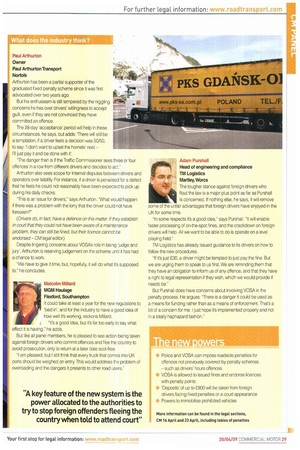Pau; AI - Um:Teri
Page 29

If you've noticed an error in this article please click here to report it so we can fix it.
Owner Paul Arthurton Transport Norfolk Arthurton has been a partial supporter of the graduated fixed penalty scheme since it was first advocated over two years ago.
But his enthusiasm is still tempered by the niggling concerns he has over drivers' willingness to accept guilt, even if they are not convinced they have committed an offence.
The 28-day 'acceptance' period will help in these circumstances, he says, but adds: There will still be a temptation, if a driver feels a decision was 50/50, to say: 'I don't want to upset the hornets' nest I'll just pay it and be done with it'.
"The danger then is if the Traffic Commissioner sees three or four offences in a row from different drivers and decides to act."
Arthurton also sees scope for internal disputes between drivers and operators over liability. For instance, if a driver is penalised for a defect that he feels he could not reasonably have been expected to pick up during his daily checks.
"This is an Issue for drivers," says Arthurian, "What would happen if there was a problem with the lorry that the driver could not have foreseen?"
(Drivers do, in fact. have a defence on this matter If they establish in court that they could not have been aware of a maintenance problem, they can still be fined, but their licence cannot be endorsed CM legal editor.) Despite lingering concerns about VOSAS role in being 'judge and jury', Arthurton is reserving judgement on the scheme until it has had a chance to work.
"We have to give it time, but, hopefully, it will do what it's supposed to," he concludes.












































































































































